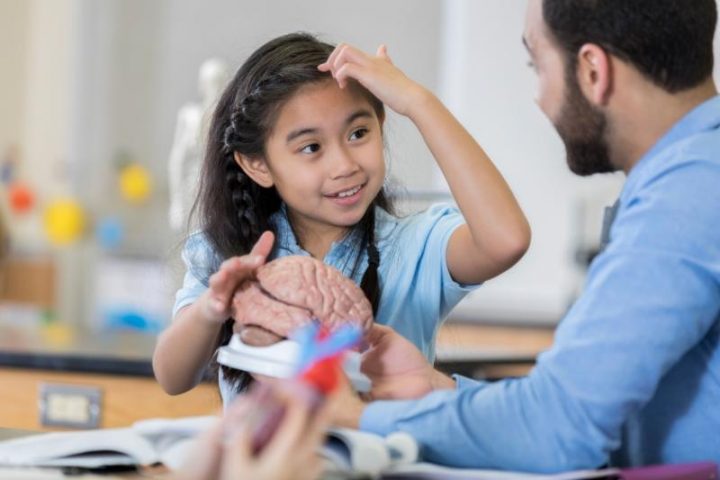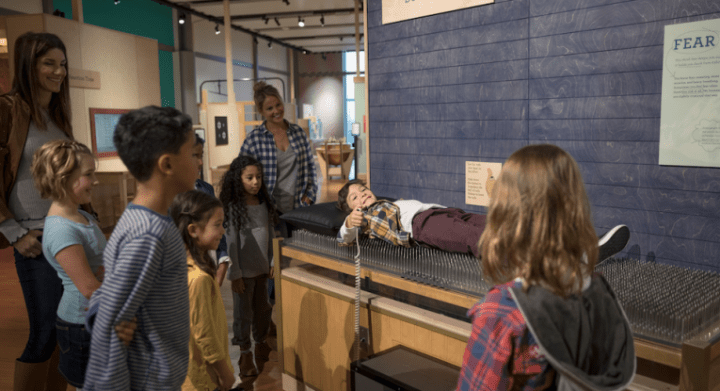Talking to kids about mental health doesn’t always make for an easy discussion — but a new program at Calgary’s Telus Spark hopes to change that by adding science and fun exhibits.

The Science of Mental Health workshop is geared towards youth (Grades 3 to 6 and 9 to 11), teachers and professionals, to explore what’s happening in their brains and bodies — or their physiology — when they’re dealing with stress.
“We have people being aware of how they’re reacting, and the link between the stimulus they’re feeling in their minds, hearts and bodies, so that they’re able to bring that back under control with breathing techniques and awareness,” said Dr. Elka Walsh, Telus Spark’s chief education and learning officer, on Wednesday.
She said teaching resiliency techniques to manage stress helps kids not to fear putting up their hands in class or stumbling during hockey practice.
And yes, kids are stressed too, be it from academic, peer, or social media pressures.
“Each of us, no matter how old we are, are dealing with different things,” she said. “The way that we’re reacting is personal.”
Age-appropriate language
Kids face fears, explore curiosity and challenge feelings at the Being Human exhibit in the science centre. There’s a bed of nails, a toilet water fountain and a sneezing wall among other displays to get students excited and a little bit nervous. Certain stations are about how we perceive grossness and social stereotypes, Walsh said.
She said the key questions in the experience are: “What’s happening to them? What’s happening with their emotions around this?”
Telus Spark staff use age-appropriate language in the discussions.
“We work with them around language and debrief: how did that make them feel?” Walsh said, “so that we’re destigmatizing conversations around mental health and the stresses that they experience, all in a really different environment where they’re empowered to have these kinds of discussions.”
Biosensors are attached to the children’s ears to pick up heart rate, pulse and breathing, as they discuss their emotions.
“They’re able to see in a very visual graph format what’s happening with their bodies so they can see how they’re reacting to those positive and negative stresses,” she said.
For high school students, brain science and resiliency strategies are amped up to a higher level.
“We want to dive in deep and really give them the opportunity because they are facing some fairly significant stresses at a very critical time in their development,” Walsh said.
Normalize conversations
The program’s goal is to normalize mental health conversations with peers and trusted adults as early as possible.
“We want to make sure that we’re empowering kids really early in their lives to not feel ashamed — that there is no shame in talking about mental health,” Walsh said.
“If a child is ever in a position where we’re talking about clinical diagnosis, they felt strong enough to come forward because they were able to talk about those positive and negative stresses.”
More than 50 per cent of lifelong mental illnesses in Canadians are apparent before age 14, she said.
“It’s really important then, if we’re seeing those mental health challenges present themselves as early as 14, to destigmatize so these individuals are not afraid and they’re not alone,” Walsh said. “That we’re able to have a community of support around them.”
That’s why the workshop was developed by a community, she said, which includes Alberta Health Services, the Calgary Board of Education, the Calgary Separate School Division, Rocky View Schools, Palix Foundation, University of Calgary, Morneau Sheppell and the Ministry of Community and Social Services.
“At the science centre, we’re an environment where people come to be curious, to explore and do so in a place with people around them where there’s no judgment,” Walsh said.
“So imagine then, an opportunity to explore mental health that augments what’s already being done in the community and provides a fun, innovative, really different way of destigmatizing mental health so that there’s information given, there’s understanding and a community built around it.”
Teachers can call to book the program for students. By the end of the year, about 500 young people will have engaged in the workshops, Walsh estimates.
Throughout her 20 years in education, Walsh has seen the stresses mount for both youth and adults, and said Telus Spark wanted to contribute to something bigger.
“If we can come together as Calgarians, we can have an incredibly mentally healthy, destigmatized community that really enables each other to be our very best and our authentic selves,” she said.



















Comments